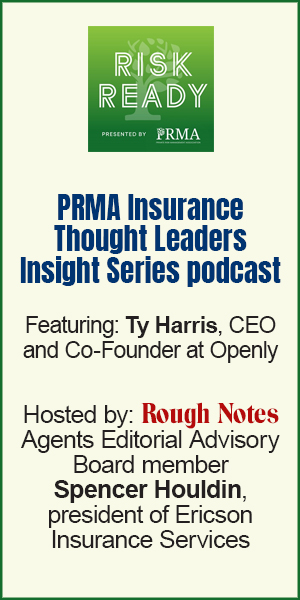Techknowfile
AGENCY OPERATIONS: KEEPING THE PLATES SPINNING
Planning and use of the right tools can help agencies grow
As operations manager at a small agency with 22 employees, I wear multiple hats. In my dealings with other agency employees from similar-sized operations, I know I’m not alone. Many of you operate the same way.
Among my responsibilities is equipping fellow team members to create a great customer experience. Having the right tools and the right plan enables me to provide training for our service and sales staff in several areas, including coverage knowledge, workflows, and customer service.
To help mitigate some of the day-to-day challenges that accompany managing a small agency, it is important to have a plan in place for the task at hand.
During the past several years, we’ve faced some challenges—in our agency and in the industry as a whole, including an aging workforce; a hardening market (particularly in commercial property/casualty); competition from other independent agents and direct writers; and the increased threat of insurtech.
As an established independent agency, we have the product knowledge, we have the markets, and we have the relationships, but sometimes combining those three things at the right time can be a challenge. I guess the real “trick” is juggling them all without dropping something.
Now I’m a strong proponent of the independent agency system. Our carrier relationships are extremely important, and we are contractual representatives of those carriers. At the same time, however, I believe our independence lets us do a better job for our clients by comparing available products. It also lets us find solutions for customers with some more unusual or hazardous risks. Instead of having an insurance company dictate to us what type of business we write, we make decisions based on our expertise and find the insurance companies that can best handle the type of business we write.
This added flexibility brings challenges, but I wouldn’t want it any other way and neither would our clients.
At times, it seems like my title should be orchestra conductor—or maybe cruise director—especially when I need to help new hires throughout the day in addition to my other responsibilities. It’s a balancing act that requires patience and an ability to prioritize.
The plan
To help mitigate some of the day-to-day challenges that accompany managing a small agency, it is important to have a plan in place for the task at hand. For example, we currently have three account managers and one assistant account manager who are actively working a desk, but they each require a different degree of training. If I’m not careful, I can spend my entire day just answering their questions. Instead, I plan ahead and make sure they have things they can do without my help, and then I schedule time to work with each of them.
Of course, an “emergency” can always happen, and these team members know they can reach out to me or one of our more experienced people, if needed. However, sticking to the plan keeps us all focused and moving forward.
That is just one example, and it’s a simple concept, but I know I must fight the temptation to just jump in and try to fix something without taking a few minutes to plan.
The tools
Teams play best when they’re well equipped. When building a sales team, it is important to have people with different personality types working together. For example, a producer can work well with a prospective client but may not be great with details. At the same time, the eagle-eyed assistant account manager never misses dotting an “i” or crossing a “t” but may not thrive (understatement) if asked to propose an insurance program to a client.
Supporting these differences sometimes is easier said than done, especially with a small agency. But if we are to succeed, we need to recognize and embrace the differences, and then put processes in place to leverage each individual’s strengths. It’s how you form and maintain a great team.
Our agency technology has been a tremendous help in my role as operations manager. I probably could fill pages on this subject alone, but here are just a few examples:
- Technology has allowed our agency to keep some key people years before remote working was the norm. Our agency is in a small town, and it’s not easy to find experienced staff. Many years ago, one of our account managers had to leave Graham, Texas, due to family obligations. We knew it would be difficult to replace someone with her expertise in handling complicated commercial insurance accounts. Thanks to document management and remote access available through our agency management system, she was able to continue working for our agency. Since that time, we’ve had other employees need to work remotely, so this was a game changer for our agency!
- We moved from Applied TAM to Applied Epic in December 2014. While there are many things about our new system that increased our productivity, I think most significant is the marketing. Many of our accounts require large, complicated submissions for new and renewal business. It took some getting used to, but I can’t imagine going back to the “old way” of submitting business and keeping track of carrier responses.
- Another technology, our client portal (CSR24), lets our agency keep up with the increasing client demand of 24/7 access and service. It goes a long way in ensuring good customer experience. Over the last few years, its value has increased, as we’ve used it to deliver policy documents to many of our clients who chose to opt out of receiving a hard copy.
The future
I’ve learned a lot as we strive for continuous growth. Some of the most important lessons I can share with other agency operations managers are to never stop learning, to embrace change and growth, and to encourage your staff to do the same.
We truly have a great sales team of producers, account managers, and assistant account managers here at Bryan Insurance Agency. Several people have been with us for more than 25 years, and several more are nearing that number. From the person who has been here the longest to our newest assistant account manager who is nearing the one-year mark, our people are bright, hard-working, and passionate about insurance, risk management, and client service.
Our agency culture very deliberately encourages ideas and thinking outside the box. These are all great things. But our business is one where documentation and following certain processes are required—and that’s where our agency management system earns its place alongside team members as a valuable contributor.
The author
Sonya Edwards is the operations manager at Bryan Insurance Agency in Graham, Texas. She is a member of Applied Client Network and is secretaryof its Greater Texas chapter. Backed by the collective strength of 20,000 members worldwide, Applied Client Network is committed to leading insurance business practices and Applied software use through education, peer-to-peer information exchange and advocacy. Visit www.appliedclientnetwork.com for more information.





